
September 23, 2021
 Courtesy/Penn Medicine
Courtesy/Penn Medicine
Chelsea Jovanovich, left, smiles as Cheryl Cichonski-Urban, right, meets baby Telden for the first time. Cichonski-Urban donated her uterus to Jovanovich, who had Uterine Factor Infertility. Telden is first child born from living uterus donor through Penn Medicine, which hopes the procedure will become more accessible to women with infertility.
Chelsea Jovanovich was only 15 years old when she learned that she would never be able to get pregnant — or so she was told.
Jovanovich was diagnosed with a rare congenital disorder, Mayer-Rokitansky-Küster-Hauser Syndrome, that causes an underdeveloped or nonexistent uterus.
Those who have the condition – about 1 in 4,500 girls are born with it – suffer from Uterine Factor Infertility, or UFI, and are unable to achieve pregnancy.
If a woman with MRKH Syndrome or another condition that causes UFI wants to have a child, her options historically have been limited to adoption or in-vitro fertilization with a gestational carrier.
That's about 1 in 500 women, or as much as 5% of reproductive-aged women worldwide. Approximately 80,000 women are affected by these associated conditions in the United States alone.
Jovanovich, 33, struggled emotionally for years to come to grips with the reality of her infertility. She had a hard time talking about it and feeling understood. She attended the baby showers of her friends and family, always outwardly happy for them while feeling stuck in her life and hurt inside.
She and her husband, Jake, had looked into adoption and also had done extensive research on gestational carriers. They even approached a close friend about it and had planned to move forward, but the arrangement ultimately wasn't feasible.
Then Jovanovich came across information about Penn Medicine's living-donor uterus transplant program, one of a few in the world that have pioneered and pushed the boundaries of the emerging procedure.
"I was grasping at straws," said Jovanovich, who is from Billings, Montana. "I was in desperation when I heard about the program and I was at my wit's end."
Expecting little, Jovanovich took a shot in the dark and applied to be a part of Penn's UNTIL (Uterus Transplantation for Uterine Factor Infertility) clinical trial on the other side of the country.
The whirlwind of events that followed have made Jovanovich the proud mother of Telden, a four-month-old boy whose life was made possible by an altruistic donor from Bucks County and the dedication of a Penn Medicine team that believes this story can be possible for other struggling women.
The medical field's quest to expand options for women with infertility hit a major breakthrough in 2014 when a team of Swedish doctors welcomed the world's first baby born from a living-donor uterus transplant.
In the years since, about 100 women around the world have had successful uterus transplants from live and deceased donors, including 32 procedures in the United States. Penn Medicine's uterus transplant program, launched in 2017, celebrated the country's second birth stemming from a deceased donor in 2019.
For me, it really was a life-saving organ. ... For me, and I've heard other people describe infertility this way, it's kind of like a cancer diagnosis. It's a terminal disease. We have to live with it forever and it's very devastating. – Chelsea Jovanovich, transplant recipient
Elsewhere in the U.S., Baylor University Medical Center in Dallas and the Cleveland Clinic in Ohio have played a leading role in spearheading the advancement of uterus transplantation, delivering children from both live and deceased donors over the past several years.
In May, Jovanovich became Penn Medicine's first woman to give birth after being matched with a living-donor. Unlike many of the early Swedish trial patients, who received their organs from family members, this was a complete stranger who volunteered her body in order to help realize another family's dreams.
Cheryl Cichonski-Urban, of Langhorne, considers her decision to undergo surgery and donate her uterus to Jovanovich among the best she's ever made.
The 42-year-old mother of two heard about Penn Medicine's transplant program while watching the news and said her mind was blown by the concept. A former nursing student, medical advancement remained a lasting fascination for her. She also understood the life-changing power of pregnancy.
"I had no idea that this was even possible," Cichonski-Urban said. "I think that kind of reeled me in, to be part of something groundbreaking."
The matching process is fairly straightforward, relying on blood type and a standard of overall physical fitness. Additional precautions are taken for potential recipients who have had their uteruses removed and may face greater complications from foreign blood or the new organ. Donors must be between 30-45 years old, an age limit established to minimize the risk of regret.
The key to the clinical trial at Penn Medicine is that the cost of the transplant surgery is fully covered by the institution. There are other out-of-pocket costs, like IVF and prenatal care, but competitive trials like this are still the only viable route to a uterus transplant for most families in the United States, since insurance companies don't yet cover the procedure.
At Baylor College of Medicine, for instance, the initial trial of approximately 20 transplants has lapsed and the institution now charges a case rate that runs several hundred thousand dollars for the surgery — fully at the expense of the recipient.
Dr. Kathleen O'Neill
"Additional transplants are going to require additional support from the University of Pennsylvania," said Dr. Kathleen O'Neill, an obstetrician and co-principal investigator of Penn's uterus transplant program. "I think at some point, we will offer it as a case rate, once we feel comfortable that in our hands it's clinical care and not research. But we're not at that stage just yet. Once they are no longer covered by institutions — and that won't continue indefinitely — then you're looking at about $250,000."
Refining the surgery beyond the research phase is part of the conundrum that uterus transplantation faces. When it's ready to be practiced more broadly, where will the patients be if most of them can't afford it? Where will the donors be if they don't have adequate safeguards for taking time off work to recover?
"We don't really have support for the treatment of infertility, which we all agree is a disease," O'Neill said. "There's not universal agreement about how it should be covered. If there's not some degree of financial support from insurance companies, then the cost is never going to go down and it's never going to be accessible to the majority of the public."
Working closely with Jovanovich and Cichonski-Urban, O'Neill has witnessed first-hand how powerful a uterus transplant can be for both the recipient and the donor. She believes the biggest barrier to expansion of these procedures isn't a limitation of medicine, but rather the lack of social support available to women with infertility.
"This is not just a problem for uterus transplants. It's a problem for fertility care and services in general," O'Neill said. "Diagnosis and treatment of infertility is not covered by some insurances and not covered by federal insurance like Medicaid and Medicare. It's a disease that does not get the consideration it needs. I can't even do a workup to find out why somebody is not getting pregnant for a lot of individuals who are not covered."
To understand why Jovanovich and Cichonski-Urban would put their bodies through intensive uterus transplant surgeries and recovery care to become medical trailblazers, it requires looking honestly at what infertility can mean to many women.
"It really weighs on your mental health," Jovanovich said. "For me, it really was a life-saving organ. We're put on this earth and it's our natural instinct to want to make babies. For me, and I've heard other people describe infertility this way, it's kind of like a cancer diagnosis. It's a terminal disease. We have to live with it forever and it's very devastating."
Those in Jovanovich's shoes who opt for adoption or surrogacy have entirely valid and noble reasons for doing so, but it's still important to remember that both can be challenging, costly paths to pursue in their own right.
"The alternative to a uterus transplant is no children, adoption or the use of a gestational carrier," O'Neill said. "It could be your sister, in which case you don't have to pay. But 75% go through compensated carriers, and that usually costs between $90,000-$150,000 per carrier."
When Jovanovich looked into getting a gestational carrier, she struggled to get her mind beyond the importance she placed on bearing her own child.
"I wanted more control. You're never going to be able to control everything, but with uterine transplant, I knew I would be able to determine what I was going to be putting into my body, and sleep and food and exercise," Jovanovich said. "With a gestational carrier, I wouldn't be able to do that."
At Penn Medicine, prospective uterus transplant recipients are always asked what their optimal choice to expand their family would be if cost wasn't an issue. O'Neill has heard a range of responses.
"To say that if one costs zero, all people would do that is not accurate," O'Neill said. "There are still going to be people who say, 'I don't want the risks of a uterus transplant, I want a carrier.' And then there are going to be people who say, 'I don't want a carrier, I want to experience pregnancy myself.' People have said to me, 'What's wrong with having a gestational carrier? Why would women put themselves through all of this?' I think there's room for all of these options."
Dr. Nawar Latif is a gynecology oncologist and surgical director of Penn Medicine's uterus transplant program. He performed the surgeries on Jovanovich and Cichonski-Urban in February 2020, just before COVID-19 escalated into a full-scale global pandemic.
Latif is passionate about pioneering new surgeries at Penn and utilizing robotics to make procedures minimally-invasive. This typically makes them less time-consuming to complete and less taxing for recovering patients.
When Latif traveled to Sweden and Texas to observe the techniques being used for uterus transplant surgeries, he immediately knew robotics would be critical to making the surgery more manageable and efficient.
Unlike a typical hysterectomy, removing the uterus from a donor involves cutting the vessels in a way that preserves them and enables them to be mapped to the vasculature of the recipient. For women with MRKH born entirely without a uterus, such as Jovanovich, the procedure doesn't require the removal of an additional, underdeveloped organ from the recipient.
By using a robotic approach instead of open surgery, Latif was able to reduce the incision size to a series of abdominal cuts measuring just five millimeters each. The donor portion of the surgery on Cichonski-Urban was all robotic, spanning about 12 hours, while the recipient surgery on Jovanovich used a hybrid approach — about six hours robotic and another six hours manually.
Dr. Nawar Latif
Both surgeries were completed back-to-back, with about a 15-minute break in between.
"That's why I signed up for this. It's a challenge," Latif said. "The excitement of the moment keeps you going and there's an adrenaline rush in a stressful situation. That's how we keep going with these day-long surgeries.
The risks and rigors of uterus transplant surgery are different for the recipient and the donor, both in terms of the procedures and the stakes involved for each, but each of the women chosen for Penn Medicine's first living-donor transplant said they had no regrets about their choices.
"The surgery was difficult, but it isn't anything I wouldn't do again," Jovanovich said. "With any operation comes recovery and pain. I think the hardest part for me is the immunosuppressant medication. That's what really took a toll. My body has become used to them now, but in the beginning I was very tired. I had headaches. I was jittery. Even in the hospital, I had some hallucinations because they pump you full of medications so you don't reject the organ. There was pain, but nothing too different from another type of operation."
Chelsea Jovanovich recovers after undergoing uterus transplant recipient surgery.
Unlike other organ transplants, however, the donated uterus is only needed for as long as the recipient plans to have children.
"The goal is to have a maximum of two successful pregnancies and then remove the uterus so the patient can stop taking immunosuppressants," Latif said.
Jovanovich said the pandemic was worrisome to her, but she was more concerned that her plans might be ruined after uprooting her life in Montana to get surgery and stay in the Philadelphia area.
"I was scared of the pandemic, but I was more scared of losing my organ, because if had gotten COVID-19, there would be a possibility the uterus would need to be removed to bring my immunity up," Jovanovich said.
Cichonski-Urban, the donor, required a few weeks to recover from her surgery. She feels the pandemic lockdown actually made the whole experience easier for her family and support network once she was released from the hospital after 10 days.
"Recovery was definitely rough," Cichonski-Urban said. "I had some minor complications, but I'm in a good place now. I don't have a single regret. Everyone was at home. The fact that they could see me and know that I was OK made a big difference."
She especially credited her husband.
"I joke that I was the one who was under, but he was the one sitting in the waiting room for 15 hours," Cichonski-Urban said. "He was handling the phone calls during the aftermath and response from everybody."
Cheryl Urban-Cichonski recovers after undergoing uterus transplant donor surgery.
Just as importantly, Cichonski-Urban was fortunate to have an employer that backed her decision to be a donor and gave her a generous amount of time to recover.
Putting aside questions of cost, donor recovery time remains one of the trickiest issues to address in expanding living-donor uterus transplant surgery. It's illegal for donors to be compensated for their organs, which means many have to rely on flexible work policies that enable them to undergo the operation and heal. For Penn's program, that's currently about three weeks, assuming no surgical complications.
The first issue is that we have to recognize infertility as a condition, not something that's an option. If health insurance companies don't see it as a disease, it becomes harder to cover any treatment for infertility. – Dr. Nawar Latif, Penn Medicine
"The way to improve that and take that disincentive away is to make the recovery easier, by making it minimally invasive, and by having some financial support for these people if they do have to take time off," O'Neill said.
Though there are some grant programs that support organ donors by covering travel expenses and other costs, these funds aren't available to everybody. Cichonski-Urban applied for a grant but didn't get approved.
"The more we do these surgeries, the more we learn new things and the more we become better," Latif said. "The length of the surgery should be shorter for the patients, both the recipient and the donor. If we can continue to do this minimally invasive procedure, the length of time a donor needs to take off from work will go down and will open more doors."
With further technical experience, Latif feels confident that the donor surgery can eventually be brought down to a few days of recovery and continued monitoring. For the recipient, he thinks the recovery time can be condensed to about a week in the hospital followed by a few weeks of at-home recovery and routine monitoring.
O'Neill hopes the expertise Latif brings to the Penn Medicine program will drive forward the conversation about future insurance coverage of uterus transplants.
"New technology and new procedures are the evolution of all of these things," O'Neill said. "The first liver transplant cost $1 million. Once it got coverage, it came down to an average of about $35,000. You need to actually get insurance coverage to drive the cost down so that even people who don't have coverage can afford them. That's the crazy thing about our health care system. It doesn't make intuitive sense, but that's what we need. Coverage drives the cost down so that more people can afford it."
Completing a successful uterus transplant is only half of the battle in validating the operation's future potential.
In order to for it to pay off, there has to be a baby.
The brief history of the procedure has had its share of failures and successes at the limited number of institutions performing it. Sometimes donor organs are rejected and need to be removed. Sometimes the recipient can't become pregnant. These cases are documented and don't have the happy ending celebrated by Penn Medicine.
After a uterus transplant surgery, six months must pass to ensure the organ has been assimilated into the recipient's body. From there, IVF follows to deliver an embryo into the uterus. (Natural conception isn't possible in these surgeries, since the Fallopian tubes of the donor are not involved in the transplant).
The first embryo O'Neill implanted in Jovanovich's new uterus in August 2020 resulted in a miscarriage. There were a few months of anxiety all around, but the second attempt in October was a success and Jovanovich became pregnant.
During all this time, Jovanovich and Cichonski-Urban weren't permitted to communicate or meet each other, in accordance with laws governing organ donation among both deceased and live donors. These rules exist not only to protect patient privacy, but also to hedge the emotional risks carried on all sides of a transplant.
Jovanovich and Cichonski-Urban both felt pretty sure they wanted to meet one another. During her journey to motherhood, when Jovanovich had researched open adoptions, she felt felt she would have wanted her child to have a connection to her birth mother. She felt there were similarities in this situation.
"Without Cheryl, Telden would never be here," Jovanovich said. "So I feel like it's only fair for her to be a part of his life, too."
Cheryl Cichonski-Urban (left) and Chelsea Jovanovich (right) meet before Telden's birth.
"If we had met prior, that would have been a lot for (Chelsea) and it's a connection she may not have wanted to keep," Cichonski-Urban said. "Things don't always work out. We were very fortunate everything went so well. I've gotten more out of this than Chelsea even realizes. When she sends me a picture of Telden, to my core it makes me so happy. I feel like they're part of our family. Something brought us together and I can't explain it. It was more than chance. It's been one of the best decisions of my life."
Jovanovich's gratitude for Cheryl's donation still brings tears to her eyes when she talks about it. They both cry when they think about the bond they've shared since they first connected in January, a few months before Telden was born. Jovanovich even invited Cichonski-Urban to participate in her maternity photoshoot, where they met each other for the first time.
Telden was born May 18 via C-section, the most common delivery method for women with UFI, who may face complications with vaginal birth or have other conditions such as pre-eclampsia.
"I never thought possible in my wildest dreams that I would ever be able to carry a baby," Jovanovich said. "I'm living my dream. I never gave up. For other women in my situation, as hard as it is, there's always hope. I think that we're getting close to a solution that hopefully will be available to everybody."
The uterus transplant team at Penn Medicine is enthusiastic about what the future holds for women with infertility, but O'Neill and Latif also know much needs to change in the landscape of the U.S. health care system if the procedure is going to become more mainstream.
There hasn't been a shortage of women — potential recipients and donors — applying for a chance to be a part of the clinical trial while it lasts. More than 1,200 people have shown interest, including upwards of 600 women who are willing to donate.
"With uterus transplant, the problem so far is not the number of women willing to step forward to be living donors," O'Neill said. "It's actually incredibly high and very surprising."
The program is still committed to using organs from deceased donors as well, but that's far less predictable and allows much less flexibility in planning. The recipient and surgical team need to be ready to act suddenly when a match is determined.
Latif believes a major facet of expanding uterus transplants will be expanding the pool of viable living donors, which still exceeds the demand among potential recipients.
"This is our main goal and concern. How can we get to the point that this is not just something we do for five or 10 patients, or even 20 patients?" Latif said. "The first issue is that we have to recognize infertility as a condition, not something that's an option. If health insurance companies don't see it as a disease, it becomes harder to cover any treatment for infertility."
On the donor side, O'Neill said Penn Medicine has encountered its share of timing issues related to work.
"A lot of the donors that we've had step forward said they couldn't do the procedure until the next year because they had already used some of their sick-leave. This should not be the way that it is," O'Neill said. "It shouldn't be that people who are donating their organs to help others are using their own sick time to recover from the surgery, but that is currently the state of affairs."
"What's unique about uterus transplant is that it meets these two problems," Latif added. "It's a fertility problem, but it's also an organ donor recovery issue."
Chelsea Jovanovich (left) and Cheryl-Cichonski Urban (right) get together after Telden's birth.
"I don't think people realize these donors do this out of the kindness of their hearts, literally at their own expense," O'Neill said, referring to the travel and time-off expenses donors carry. "I think that's a huge message that people need to understand."
On the insurance side, Latif was clear about how far behind that society lags in fertility care.
"We would like to be able to say, in the United States, this is a human right," Latif said. "It's a woman's right that if she has infertility, she has to be covered by insurance to take care of that condition."
Cichonski-Urban said she's been happy to act as an ambassador for uterus transplantation. She doesn't gravitate to the spotlight naturally, but she welcomes offering her informed view of what being a living-donor entails.
"I've had people reach out to me and ask me what it's like to be a donor — like what are the deep-down details?" Cichonski-Urban said. "I'm honest. I tell my experience and try to get this message and information out as much as possible."
In the majority of transplants, organ donations are made by family members or through swap programs that help line up matches among larger groups of families stuck in the same boat. Giving an organ is an inherently selfless and risk-bearing act — regardless of how the match is made — but O'Neill feels the uterus has some important distinctions from other organs like kidneys, for example.
"You need your kidneys and people are a little bit more reluctant to give them, even though you have two of them," O'Neill said. "With the uterus, these people are done. They're not going to use the uterus for anything else. A lot of people say family is the most important thing in their life, so they recognize that."
Many of the women who approach Penn Medicine about becoming a donor have a long list of questions about what to expect. Will there be damage to surrounding structures like the bowel and bladder? Will sex feel different? How likely is an infection?
In the long run, O'Neill said, most side effects are minimal as long as there aren't any surgical complications. The procedure also doesn't induce menopause any earlier than a woman would naturally go through it, though some of the typical bleeding symptoms won't be present without a uterus.
Hopeful recipients have similar questions about their eligibility and the challenges of going through everything from surgery to having a child.
For women dealing with certain causes of infertility, a uterus transplant may not be a viable option. Those who have hormonal issues that prevent ovulation, or who became infertile due to some cancer treatments, for example, would not benefit from the procedure.
Latif developed a much stronger understanding of the emotional pain involved with infertility when he become involved with the uterus transplant program. What began as a career challenge became much more for him and opened his eyes to the sacrifices women will make in the name of childbirth.
"There's something so much bigger than just having a successful surgery," Latif said. "It's hard to understand as a man how important it is for women to be pregnant. Even for the women on our team, we all couldn't understand it until we met these women. They really felt this was an important part of their identity. They wanted to be pregnant. That touched me a lot."
Cichonski-Urban and Jovanovich both look forward to future trips to visit each other in Bucks County and Montana.
Jovanovich is sticking around the Philadelphia area because she's planning to become pregnant with her second child in November, if all goes well. After that, she'll have the uterus removed and will be able to discontinue the immunosuppressant drugs.
Sometimes, Jovanovich still struggles to understand what could possibly have motivated Cheryl to be so giving.
But Cichonski-Urban doesn't hesitate to express how much she's gotten from the experience.
"I have Cheslea and I have Telden. I really do feel that way," Cichonski-Urban said. "Chelsea has involved me more than I ever would have imagined. As much as Telden's not my child, they both feel like family. And that is very fulfilling."
It's a unique relationship that has proven to be among the most valuable outcomes of the transplant, and Jovanovich will tell Telden about how he was born as soon as he's old enough to understand.
"Telden will definitely know Aunt Cheryl," Jovanovich said. "I mean, Cheryl will be in my life forever."
From left to right: Jake Jovanovich, Chelsea Jovanovich with baby Telden, Cheryl Cichonski-Urban and Brian Urban.
"I'm proud of my scar," Cichonski Urban said. "In a strange way, I feel like it's the connection between Chelsea and I. Sometimes, I can't believe that it happened and that Telden is here. This is real life. It's like something you see in a movie."
O'Neill was thrilled with the living-donor experience and the sense that so many hopes were riding on it. One of her most joyous moments was telling Cichonski-Urban that Telden had been born.
"To be able to say to Cheryl, who went through a lot, that your donation made a family — that was her goal," O'Neill said. "I wanted to see more people celebrate in their success."
"She's the most altruistic person I've ever met in my life," Latif added. "She just wants to help people. It makes you think about the bigger picture of what we're doing. It's about choice. I want to have all the choices available for me to live my life the way I want. That much, we should be able to do for women who cannot be pregnant. As a surgeon, as medical professionals, as a society, we should be able to provide that to them."
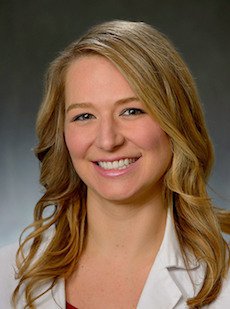 Courtesy/Penn Medicine
Courtesy/Penn Medicine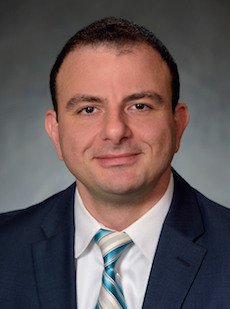 Courtesy/Penn Medicine
Courtesy/Penn Medicine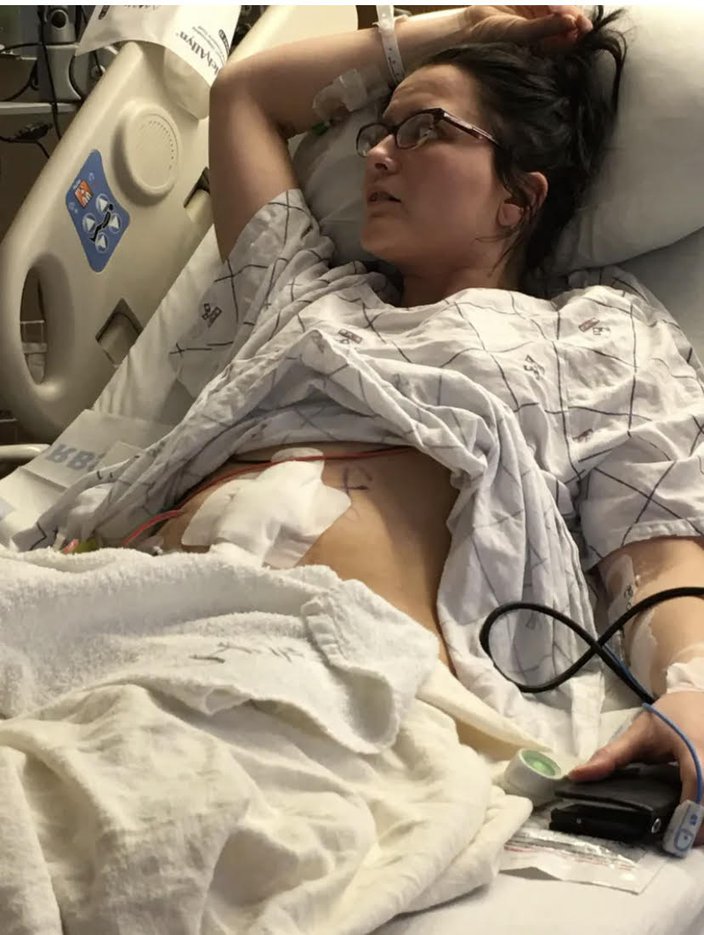 Courtesy/Penn Medicine
Courtesy/Penn Medicine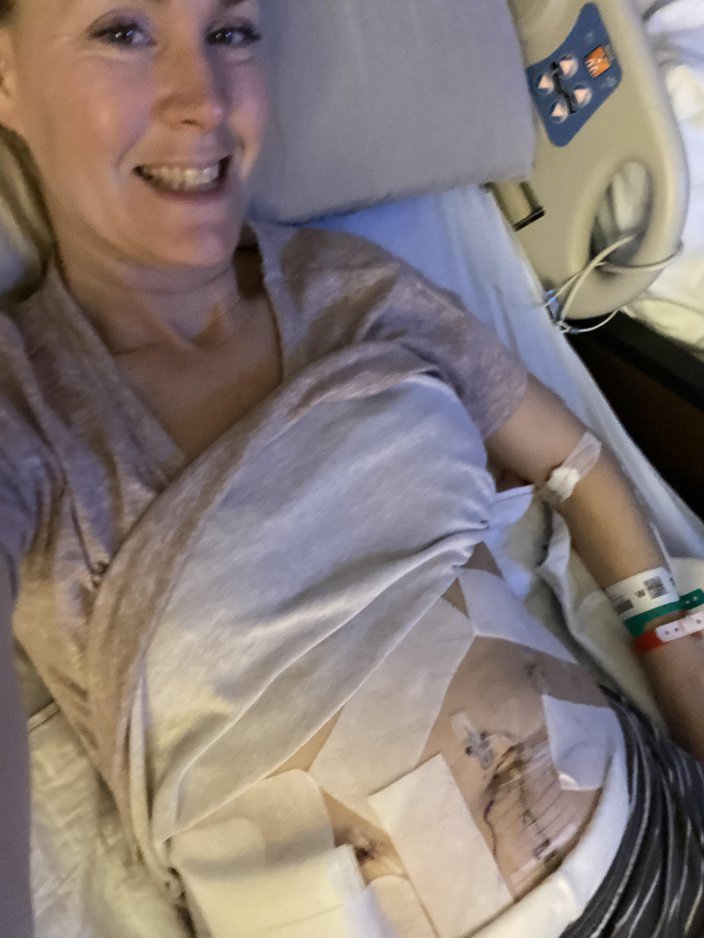 Courtesy/Penn Medicine
Courtesy/Penn Medicine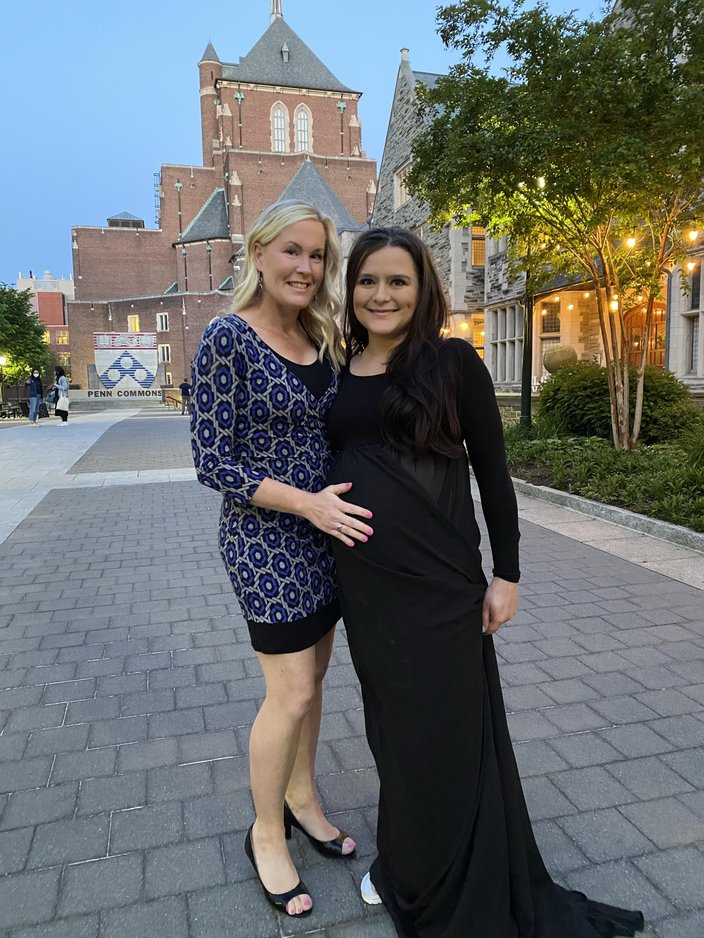 Courtesy/Cheryl Cichonski-Urban
Courtesy/Cheryl Cichonski-Urban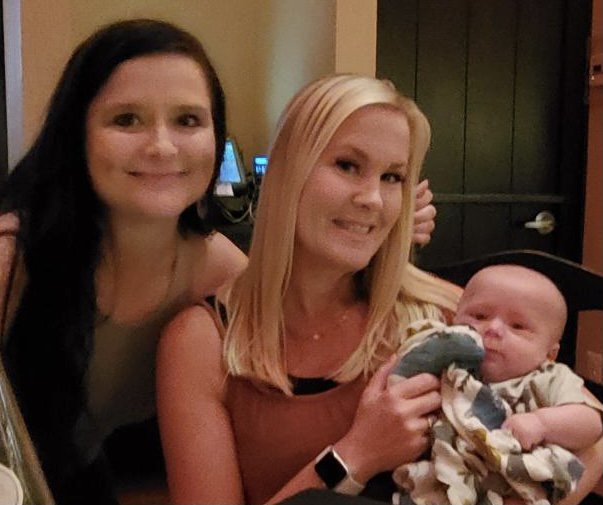 Courtesy/Cheryl Cichonski-Urban
Courtesy/Cheryl Cichonski-Urban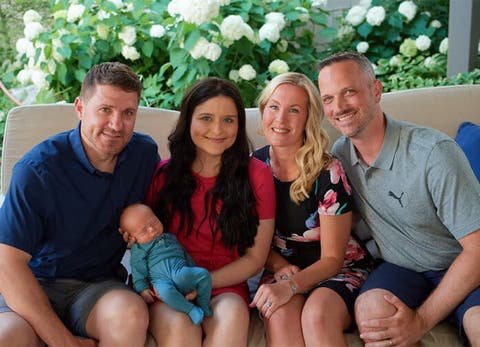 Courtesy/Cheryl Cichonski-Urban
Courtesy/Cheryl Cichonski-Urban